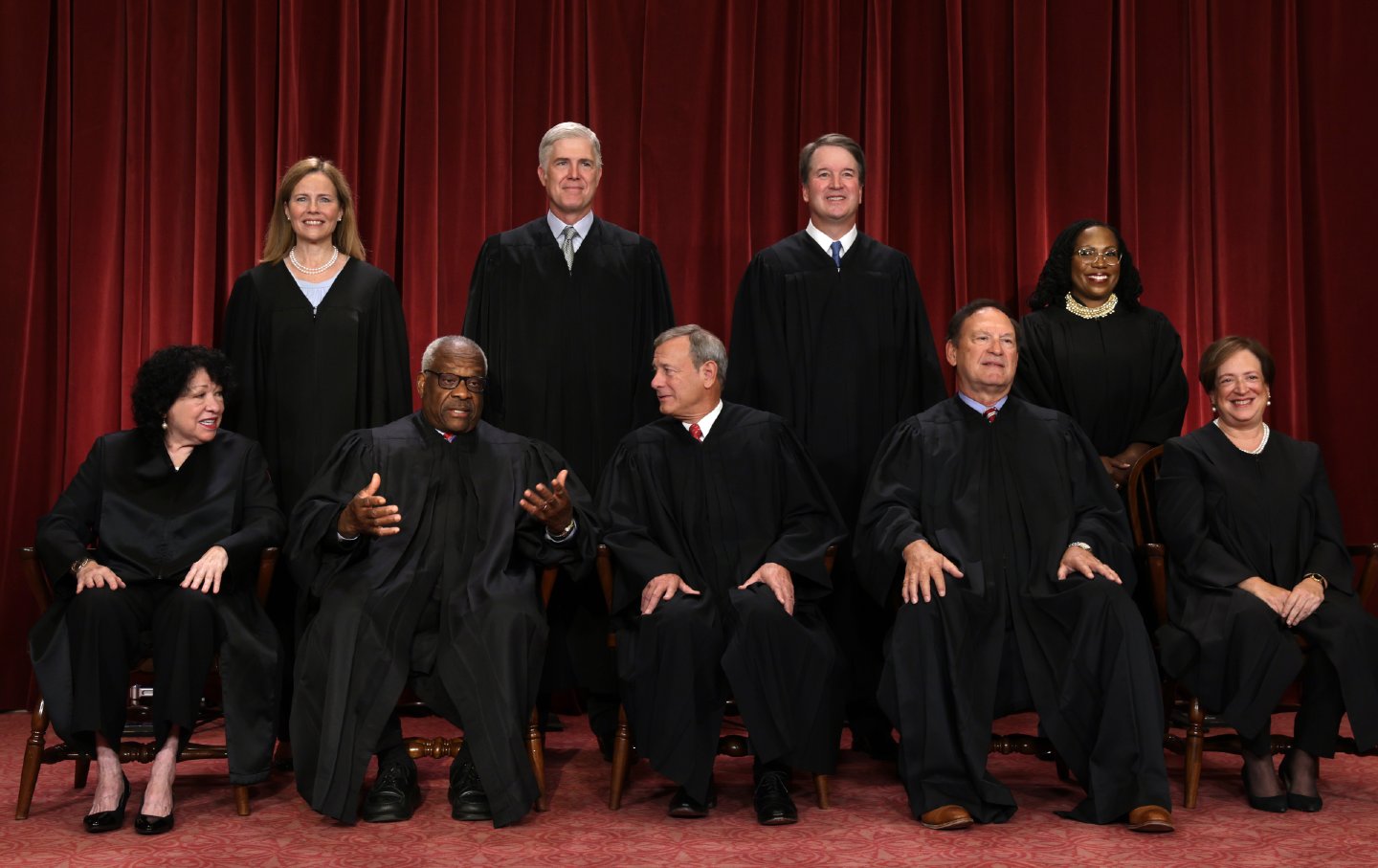The President Can Now Assassinate You, Officially
Under this new standard, a president can go on a four-to-eight-year crime spree and then retire from public life, never to be held accountable.

United States Supreme Court justices pose for their official portrait on October 7, 2022, in Washington, DC.
(Alex Wong / Getty Images)
Welp, Donald Trump won. The Supreme Court today ruled that presidents are entitled to “absolute immunity” from criminal prosecution for official acts, then contended that pressuring the vice president and the Department of Justice to overthrow the government was an “official act,” then said that talking to advisers or making public statements are “official acts” as well, and then determined that evidence of what presidents say and do cannot be used against them to establish that their acts are “unofficial.”
The ruling from the Supreme Court was 6-3, written by Chief Justice John Roberts, on a straight party-line vote, with all the Republican-appointed justices joining to give the president the power of a king. While some parts of the federal indictment against Trump will be remanded back down to the district-court trial judge to determine whether any of Trump’s actions were “unofficial” (“unofficial” acts, the court says, are not entitled to immunity), Trump’s victory in front of the Supreme Court is total. Essentially, all he has to do is claim that everything he did to plot a coup was part of his “official” duties, and the Supreme Court provided no clear method or evidentiary standard that can be used to challenge that presumption.
Legally, there are two critical things to understand about the totality of the court’s ruling here:
- The immunity is absolute
- There is no legislative way to get rid of what the court has given
On the first point, the immunity granted to Trump in this case far exceeds the immunity granted to, say, police officers or other government officials, when they act in their official capacities. Those officials are granted “qualified” immunity from civil penalties. Because the immunity is “qualified,” it can be taken away (“pierced” is the legal jargon for taking away an official’s qualified immunity). People can bring evidence against officials and argue that they shouldn’t be given immunity because of the gravity or depravity of their acts.
Not so with Trump. Presidents are now entitled to “absolute” immunity, which means that no matter what they do, the immunity cannot be lost. They are always and forever immune, no matter what evidence is brought to bear.
Moreover, unlike other officials, presidents are now entitled to absolute immunity from criminal charges. Even a cop can be charged with, say, murder, even if they argue that killing people is part of their jobs. But not presidents. Presidents can murder, rape, steal, and pretty much do whatever they want, so long as they argue that murdering, raping, or stealing is part of the official job of the president of the United States. There is no crime that pierces the veil of absolute immunity.
And there is essentially nothing we can do to change it. The courts created qualified immunity for public officials, but it can be undone by state or federal legislatures if they pass a law removing that protection. Not so with absolute presidential immunity. The court here says that absolute immunity is required by the separation of powers inherent in the Constitution, meaning that Congress cannot take it away. Congress, according to the Supreme Court, does not have the power to pass legislation saying “the president can be prosecuted for crimes.” Impeachment, and only impeachment, is the only way to punish presidents, and, somewhat obviously, impeachment does nothing to a president who is already no longer in office.
Under this new standard, a president can go on a four-to-eight-year crime spree, steal all the money and murder all the people they can get their hands on, all under guise of presumptive “official” behavior, and then retire from public life, never to be held accountable for their crimes while in office. That, according to the court, is what the Constitution requires.
There will be Republicans and legal academics and whatever the hell job Jonathan Turley has who will go into overdrive arguing that the decision isn’t as bad as all that. These bad-faith actors will be quoted or even published in The Washington Post and The New York Times. They will argue that presidents can still be prosecuted for “unofficial acts,” and so they will say that everything is fine.
But they will be wrong, because while the Supreme Court says “unofficial” acts are still prosecutable, the court has left nearly no sphere in which the president can be said to be acting “unofficially.” And more importantly, the court has left virtually no vector of evidence that can be deployed against a president to prove that their acts were “unofficial.” If trying to overthrow the government is “official,” then what isn’t? And if we can’t use the evidence of what the president says or does, because communications with their advisers, other government officials, and the public is “official,” then how can we ever show that an act was taken “unofficially”?
Take the now-classic example of a president ordering Seal Team Six to assassinate a political rival. According to the logic of the Republicans on the Supreme Court, that would likely be an official act. According to their logic, there is also no way to prove it’s “unofficial,” because any conversation the president has with their military advisers (where, for instance, the president tells them why they want a particular person assassinated) is official and cannot be used against them.
There will doubtless be people still wondering if Trump can somehow be prosecuted: The answer is “no.” Special counsel Jack Smith will surely argue that presenting fake electors in connection with his cadre of campaign sycophants was not an “official act.” Lower-court judges may well agree. But when that appeal gets back to the Supreme Court next year, the same justices who just ruled that Trump is entitled to absolute immunity will surely rule that submitting fake electors was also part of Trump’s “official” responsibilities.
Popular
“swipe left below to view more authors”Swipe →There is no way to change that outcome in the short term. In the long term, the only way to undo the authoritarianism the court has just ushered in is to expand the Supreme Court. Democrats would have to win the upcoming presidential election and the House and the Senate. Then Congress would have to pass a law expanding the number of justices on the Supreme Court; then the Senate would have to pass that law as well, which, at a minimum, would likely have to include getting rid of the filibuster. Then the president would have to sign such a bill, and appoint additional Supreme Court justices who do not think that presidents should be kings—and then those justices would have to be confirmed. And all of that would have to happen before the current Supreme Court hears whatever Trump appeal from his January 6 charges comes up next, because if court expansion happens after the current Supreme Court dismisses the charges against him, double jeopardy will attach and Trump can never be prosecuted again under a less-fascist court.
So, since that’s not going to happen, Trump won. He won completely. He tried to overthrow the government, and he got away with it. I cannot even imagine what he’ll try if he is actually given power again, knowing full well that he will never be held accountable for literal crimes.
If you ever wondered what you’d have done in ancient Rome, when the Roman Republic was shuttered and Augustus Caesar declared himself the “first” citizen of Rome, the answer is: whatever you’re doing right now. It’s what you would have done during the Restoration of King Charles II in England, and what you would have done when Napoleon declared himself emperor of France. This, right here, is how republics die.
And the answer that cries out from the abyss of history is that most people, in real time, don’t care. Republics fall because most citizens are willing to give it away. Most people think that it won’t be that bad to lose the rule of law, and the people who stand to benefit from the ending of republican self-government tell everybody that it will be OK. When the Imperium came to be, the Romans didn’t realize that they were seeing the last form of European self-government for 2,000 years, and the ones who did were largely happy about it.
For my part, I assume that like Mark Antony’s wife, Fulvia, defiling the decapitated head of Cicero, Martha-Ann Alito will be jabbing her golden hairpin into my tongue for criticizing the powerful soon enough. But I’m just a writer. I wonder what the rest of you will do as the last vestiges of democracy are taken away by the Imperial Supreme Court and the untouchable executive officer they’ve just created.
More from The Nation

The Disturbing History of ICE’s “Death Cards” The Disturbing History of ICE’s “Death Cards”
The Vietnam-era practice is yet another example of ICE agents thrilling to the brutality they have been encouraged to cultivate.

The Red State–Blue State Healthcare Divide Is Dangerous for Everyone The Red State–Blue State Healthcare Divide Is Dangerous for Everyone
Whether or not you have access to independent, scientifically sound public health guidance may depend on how your state voted for governor.

The American Universities Programming Israel’s Killer Drones The American Universities Programming Israel’s Killer Drones
Industry partnerships in higher education are pushing STEM graduates into the business of weapons manufacturing and genocide profiteering.

In the Trump Era, Celebrating Black History Month Feels Radical Again In the Trump Era, Celebrating Black History Month Feels Radical Again
After putting on their very best performances of solidarity every Black History Month, this year corporate marketers have seemed at a loss for words.

ICE’s Detention of Pregnant People Continues a Disgraceful American Tradition ICE’s Detention of Pregnant People Continues a Disgraceful American Tradition
We are seeing yet another example of state-sanctioned violence against the reproductive futures of those deemed outside the national body.

The Price of Being Black and Proud in European Soccer The Price of Being Black and Proud in European Soccer
The Brazilian star Vinicius Jr. has repeatedly been a victim of racist abuse from soccer fans. Now, it seems such vitriol can even come from players without much consequence.


